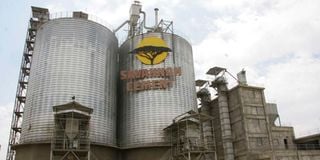Savannah Cement creditors asked to file claims

Savannah Cement Company in Athi River.
Creditors are now free to file claims against Savannah Cement, currently under administration, over unpaid debt by Absa Bank and KCB.
Mr Harveen Gadhoke, who was appointed by the two lenders as the administrator of the troubled cement manufacturer said creditors have until August 25, 2023, to file their claims.
“Any party having a claim against the company should submit their claim in writing together with relevant supporting documentation and proof of debt form, to the administrator on or before August 25, 2023, for consideration,” he said in a notice yesterday.
The cement firm was placed under administration in May after the High Court lifted an order blocking the lenders from making the move in a long-running court row.
Justice Alfred Mabeya lifted the order granted to the cement maker in December, stopping appointment of an administrator and the banks from seizing its assets.
The suspension had been granted to Savannah Cement pending a review of an earlier decision, allowing the lenders to manage its assets over a multi-million shilling debt.
This is after Savannah Cement argued that Justice WIlfrida Okwany, who allowed the two banks to enforce the securities, had been asked to recuse herself from the matter.
Justice Mabeya, however, ruled that the application for recusal had been overtaken by events.
“Following Okwany J’s delivery of the ruling dismissing the injunction application, the application for her recusal had been overtaken by events,” said the judge.
Savannah Cement applied in May 2022 disputing the debt of over Sh7 billion owed to KCB and over Sh3 billion owed to Absa.
But its application was dismissed by Justice Okwany holding that Savannah Cement owed the amounts claimed by the banks.
The financiers went ahead and appointed Harveen Gadhoke, an insolvency practitioner, as the administrator.
The lenders had signed an inter-lenders agreement undertaking to co-operate with each other in realising the assets charged to them.
In the review, the cement maker said it was working on clearing the debt and even asked the lenders to restructure the loan repayment terms.
Court filings show the cement maker has defaulted on the loan repayment and KCB said interest alone stands at Sh297 million plus a penalty of Sh13.5 million.
The firm’s director Benson Sande Ndeta admitted that the company borrowed several loans from KCB and Absa, which it has been repaying.
But in the process, he said KCB allegedly increased the amount in breach of the in duplum rule, which bars banks from charging interest that exceeds the principal amount.
Mr Ndeta said Savanna asked KCB to provide it with a statement of account to ascertain how the balances reached “astronomical levels” but the lender allegedly threatened to seize its assets.
He said the company was coerced to repay loans of Sh5 billion by the two banks to forestall the seizure.
Mr Ndeta said the planned recovery was in breach of the company’s rights and a bid by the banks to unjustly enrich itself at the expense of its shareholders.
The company pleaded with the court to stop the seizure arguing that the company will suffer losses that cannot be compensated as the assets to be seized include machinery and land, which might never be recovered.
The firm said it has entered into several contracts to supply cement to various government projects, which will automatically be terminated if the bank made good the threat.
He further said the firm is working to complete the funding of its clinker project, which will allow it to get all the funds necessary to clear the debts.
In her ruling, Justice Okwany held that Savanna admitted the debt, which is substantial and banks are the parties on the receiving end as they are likely to suffer losses.




